Information/Write-up
The title says it all: Contre-Courant — “Against the Current.” And that’s exactly what this remarkable 1976 debut from Montréal’s Opus-5 does. It swims boldly upstream from the commercial mainstream and carves out its own deeply expressive and cerebral niche within the Québec progressive rock canon. Often compared to Harmonium, Maneige, and Sloche — with trace influences from Gentle Giant and Jethro Tull — Opus-5 stands apart with a unique fusion of baroque lyricism, jazz precision, and symphonic folk complexity.
Unlike many of their contemporaries, all five members of Opus-5 contribute vocals, resulting in layered choral passages sung in crystal-clear French, free of the regional joual accent. This vocal clarity, combined with thoughtful lyrics — often politically charged, environmentally conscious, and socially reflective — gives Contre-Courant both poetic and philosophical heft. Songs like “Les Saigneurs” (a play on les seigneurs, or lords) pose sharp questions about language, class, and identity in 1970s Québec: “Est-ce normal que de parler l’anglais?”
Musically, the album is a feast. From the lush piano work of Olivier Duplessis to the agile flute flourishes of Serge Nolet, and the earthy interplay between Luc Gauthier’s acoustic guitar and Christian Leon Racine’s melodic basslines, every moment feels alive and meticulously crafted. The compositions are long-form and cinematic — particularly on the album's first three tracks, which each clock in at over nine minutes — but never meandering. Rhythms are tight, time signatures are playful, and the tone shifts fluidly between introspective and radiant.
The closest comparisons might be Gentle Giant’s intricacy, Carpe Diem’s warmth, and Locanda delle Fate’s grace, but Opus-5 truly charts its own course. There’s a pastoral charm in “Le temps des pissenlits,” a theatrical grandeur in “Il était magicien,” and a jazzy, lightly angular edge in the title track, “Contre-Courant.” Despite its dense arrangements, the album retains an organic, flowing quality — a testament to the band’s cohesion and subtlety.
Unfortunately, just as they completed their second album, their label folded, and Opus-5 vanished into obscurity. That follow-up, Sérieux ou pas, wouldn’t see release until 1989 on Disques L'Aller-Retour as well as Marquee MELOS 9009 in Japan. But Contre-Courant endures as a lost classic — a high point of Québécois prog that rewards careful listening and offers emotional and intellectual nourishment in equal measure.
Verdict:
Voluptuous, audacious, refined, and emotionally resonant — Contre-Courant is not only one of Québec’s finest progressive rock records, but one of the most essential 1970s prog albums, period. A truly “against the flow” gem.
-Robert Williston
Olivier Duplessis: claviers, vocal
Luc Gauthier: guitares, vocal
Serge Nolet: flûte, vocal
Christian Lanoie Racine: basse, vocal
Jean-Pierre Racicot: percussions, vocal
Programming (synthétiseur): Robert Le Blanc Jr.
Produced by Les Entreprises ça s’écoute
Associate producer: Mana
Delegate producer: R.A. Bob Morten
Arranged by Robert Le Blanc Jr. and Opus-5
Musical direction: Robert Le Blanc Jr.
Engineered by Alain Lalancette
Mixed by Robert Le Blanc Jr. and Alain Lalancette
Recorded at Triangle de Laval, P.Q.
Mastering (gravure): Sabin Brunet (SNB)
Art direction & management: Louis A. Fortier and Bernard G. Hogue for Les Ent. ça s’écoute Eng.
Graphic concept: André Gauthier
Artwork (dessin): Mireille Lévesque
Publicity & promotion: Nicole Dufour & Infobek
Publisher: Les Ent. ça s’écoute Eng.
Consultant: Claude Lusignan
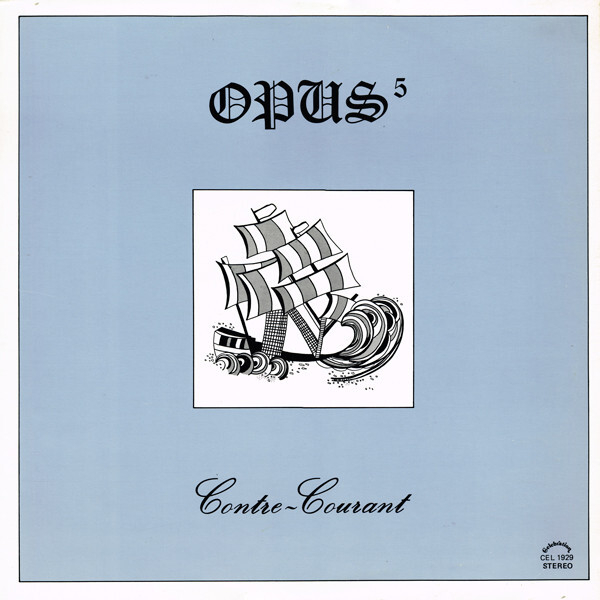
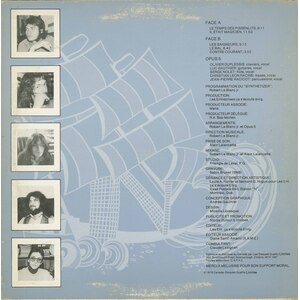
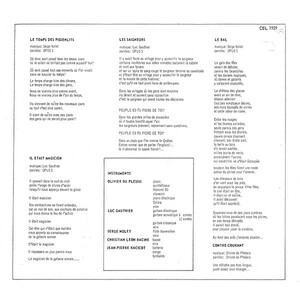
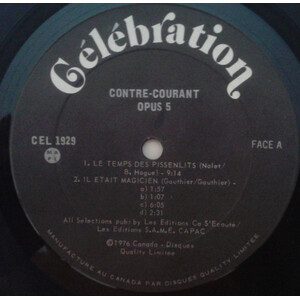
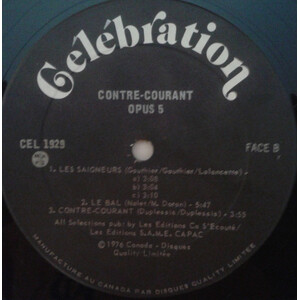
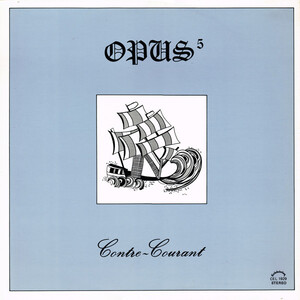
No Comments